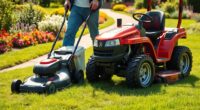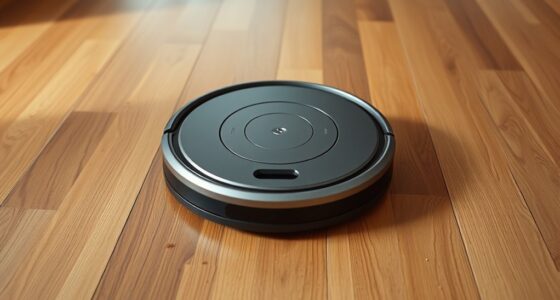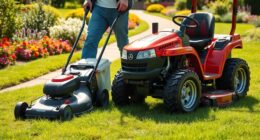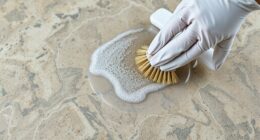When deciding between soft and stiff bristles for your cafe, consider the task at hand. Soft bristles are gentle and great for light debris, protecting delicate surfaces from scratches. Stiff bristles work better for stubborn grime but can damage sensitive surfaces if misused. Using the right type guarantees effective cleaning without harm. Want to learn how to choose the best brush for each task? Keep exploring for smarter cleaning tips.
Key Takeaways
- Soft bristles are ideal for cleaning delicate surfaces like glass and countertops without scratching.
- Stiff bristles effectively remove stubborn grime from equipment and heavy-duty surfaces.
- Using the correct bristle type prevents surface damage and prolongs cleaning tool lifespan.
- Soft bristles are more durable and cost-efficient over time due to slower wear.
- Proper technique and matching bristle stiffness to the task ensure effective cleaning without surface harm.
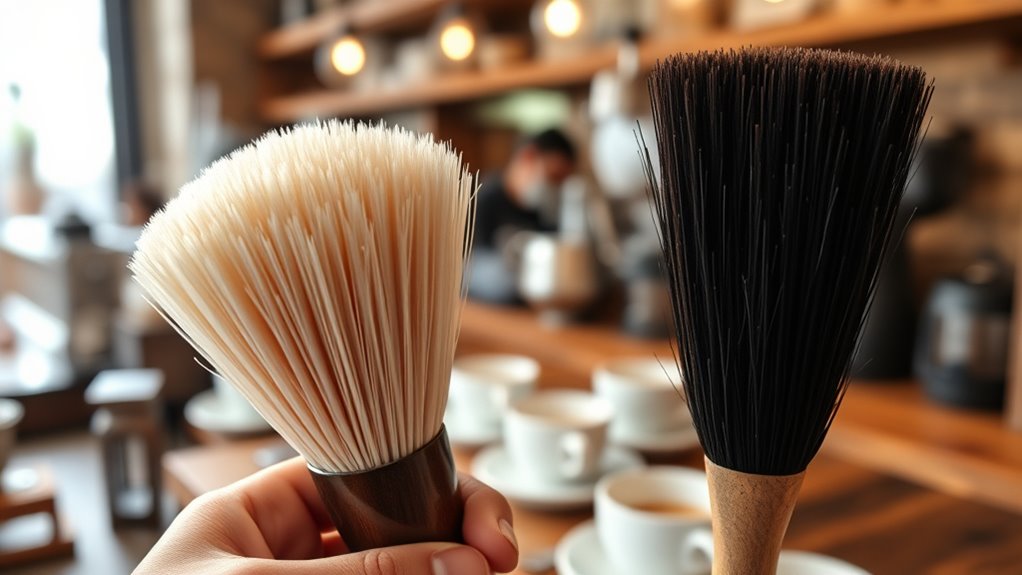
When choosing a toothbrush for your cafe’s cleaning needs, understanding the difference between soft and stiff bristles is vital. The type of bristle you select directly affects toothbrush durability and cleaning effectiveness, both of which are essential for maintaining high hygiene standards in a busy cafe environment. Soft bristles are gentle yet effective at removing light debris, making them suitable for delicate surfaces like glassware, porcelain, and certain countertops. They tend to wear out more slowly than stiffer options, providing consistent cleaning ability over time. This durability ensures you won’t need frequent replacements, saving money and reducing waste. On the other hand, stiff bristles are designed for more rigorous scrubbing, capable of tackling stubborn grime, baked-on food, or mineral deposits on equipment and surfaces. Because of their firmness, stiff bristles often deliver higher cleaning effectiveness when removing tough residues, especially in industrial cleaning tasks. However, their increased stiffness can compromise toothbrush durability if overused or applied with excessive pressure, leading to quicker wear and tear.
In a cafe setting, balancing these factors is key. Soft bristles, while less aggressive, are less likely to damage surfaces or cause scratches, making them ideal for general cleaning and delicate materials. They maintain their integrity longer, which means fewer replacements and consistent performance. Stiff bristles, however, are best reserved for specific tasks where aggressive scrubbing is necessary. Using stiff bristles on sensitive surfaces repeatedly can cause surface damage, reducing overall cleaning effectiveness over time. It’s important to match the bristle stiffness to the task at hand to optimize both toothbrush durability and cleaning effectiveness.
Another consideration is the frequency of use. Regular cleaning with soft bristles can prevent buildup and maintain surface quality without risking damage. For occasional heavy-duty cleaning, stiff bristles can be effective, but you should switch back to softer options afterward to preserve surface integrity and extend the lifespan of your cleaning tools. Proper technique also plays a role—applying too much pressure with stiff bristles can accelerate wear and diminish their cleaning effectiveness. The goal is to use the right brush with appropriate force, ensuring surfaces are thoroughly cleaned without unnecessary damage.
Frequently Asked Questions
How Do Bristle Types Affect Coffee Flavor Extraction?
Your choice of bristle material markedly impacts brewing efficiency and flavor extraction. Stiff bristles scrub coffee grounds more thoroughly, potentially enhancing extraction and resulting in a richer flavor. Soft bristles, on the other hand, are gentler, preventing over-extraction and preserving delicate aromas. By selecting the right bristle type, you can optimize brewing efficiency and achieve the ideal flavor profile, whether you prefer bold or subtle coffee notes.
Are There Specific Bristle Types for Different Brewing Methods?
Yes, there are specific bristle types for different brewing methods. For pour-over or delicate brewing, choose soft bristle brushes with fine bristle material that gently clean without damaging equipment. For espresso machines or robust brewing, stiffer bristles with durable bristle material help remove coffee residue effectively. Also, consider handle ergonomics to guarantee comfortable, precise cleaning. Picking the right combination enhances maintenance and keeps your equipment in top shape.
Can Bristle Stiffness Influence the Longevity of Cafe Equipment?
Like a careful gardener tending delicate blooms, you’ll find bristle stiffness impacts your equipment’s longevity. Stiffer bristles may seem tough, but they often wear out faster, reducing bristle durability and risking damage. Softer brushes, while gentle, improve cleaning efficiency over time, helping your gear last longer. By choosing the right stiffness, you protect your investment, ensuring your cafe equipment stays in top shape, just like a well-tended garden flourishes.
What Maintenance Routines Are Recommended for Soft Vs Stiff Bristle Brushes?
You should perform maintenance more frequently with stiff bristle brushes, about daily, using vigorous cleaning techniques to remove stubborn residue. For soft bristles, weekly maintenance suffices, focusing on gentle cleaning methods to prevent damage. Always rinse thoroughly and let brushes dry completely to avoid bacteria buildup. Adjust your routine based on usage, ensuring both types stay effective and hygienic, ultimately prolonging their lifespan and keeping your cafe equipment in top shape.
Do Customer Preferences Vary Based on Bristle Softness or Stiffness?
Ever feel like choosing the perfect brush is like searching for a soulmate? Customer preferences do vary based on bristle softness or stiffness. Soft bristles prioritize customer comfort, making cleaning gentle and pleasant, while stiff bristles focus on cleaning efficiency, tackling stubborn grime. By understanding your customers’ needs, you can match their comfort with effective cleaning, creating a memorable experience that keeps them coming back and feeling valued.
Conclusion
So, next time you reach for that brush, remember: soft bristles are like a gentle whisper, perfect for delicate surfaces, while stiff ones are the sturdy shout you need for tougher grime. Choosing the right one isn’t just about preference—it’s about knowing your surface’s voice. Think of it as a conversation with your tools: listen carefully, and you’ll get the job done right every time. After all, a good brush makes all the difference in the symphony of cleaning.

